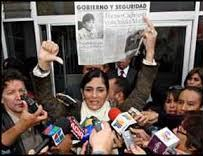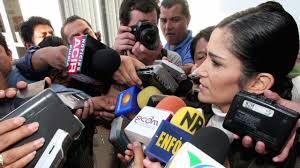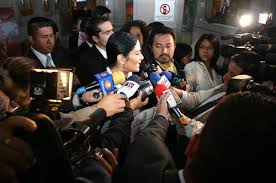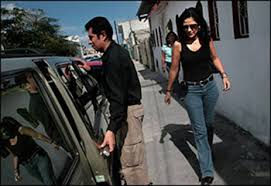Preface & Chapter 1 here. Chapter 3 here. Chapter 4 here.
On December 16, 2005, Lydia Cacho, barely recovered from the kidney failure, pneumonia and bronchitis which had put her in critical care two months earlier, was driving to the shelter, back to work. She called shelter staff, per protocol, saying she’d arrive any minute. One of her bodyguards went out on the corner and waited.
Lydia Cacho: “When I parked my truck and turned off the engine, a small car drove past, and then I got out of my vehicle. Suddenly, a silvery blue car with Puebla State plates stopped in the middle of the street, blocking the way, and three (men) jumped out, one of them wearing a white T-shirt and a shoulder holster that clearly had a gun in it. Another held a pink folder in his hand and was walking very quickly towards me. I looked to my left – behind me on the street was a white Jeep Liberty. I scanned it for plates – this one was from Puebla too. At both corners, cars were closing the street. At that moment, I was convinced they were contract killers, although I didn’t know who might have hired them. Then I glanced down the street toward the intersection – a red car was blocking it, and a man standing outside (the shelter) was gesturing to another close by. I thought they were about to shoot me, and my heart froze. The man with the folder shouted as he approached me, ‘Lydia Cacho, easy now, don’t try anything, you’re under arrest.’ There were two men coming at me head on, and another slipped around the side of my car. Terrified, and hardly realizing what I was doing, I pushed the car alarm button on my key ring and tried to climb back in, but by that time one of the men had already reached me, and he quietly pulled out a gun and hissed: ‘Don’t try anything, and don’t call your bodyguards, or we’re sure to have some fireworks on our hands’… ‘On what charges? Who’s charging me?’ I managed to ask once or twice, trying to maintain my composure… One of them took a gun, put it to my head and said, ‘Shut up!'”
The men told Lydia Cacho she was being arrested for defamation. They were taking her to the Quintana Roo Attorney General’s Office in Cancun first, they said, and then to Puebla, to jail. [Puebla, the city, is in the Mexican State of Puebla, over 1,000 kilometers from Cancun, a 20-hour car drive across five Mexican states]. ‘Don’t resist,’ one of the men threatened. ‘Journalists sometimes get killed by stray bullets.’ Lydia Cacho: “Like a slap to the face, the echo of his words knocked the air straight out of me, and I felt instantly nauseated. And they were all almost as nervous as I was. The man with the pink folder kept shoving it in my face, opening it to show me – but all of the pages inside were blank.”
“My car alarm continued to blare, and I knew that my colleagues were probably watching everything over the closed security system we had installed… I knew that everything had been recorded…(on) a hard drive (which stored) 24-hour-a-day footage from our cameras around the building… From his post at the corner…one of the three guards on my security detail witnessed everything that was happening.” A second guard, a female, later testified that the guard on the corner called the head of security, their boss. ‘Ms. Cacho is being taken away,’ he told him. The head of security asked: ‘Are they policemen?’ Despite the fact that the men abducting Lydia Cacho were wearing street clothes, not uniforms, and were blocking off the street with unmarked cars, not cop cars, the guard said, ‘They look like policemen.’ The head of security replied: ‘Let them take her then.’
*
“As we approached the building where the Office of the Attorney General for the State of Quintana Roo is housed – not 15 minutes after I had first gotten into the car – I saw that the agents had spoken the truth and we really were going to the Attorney General’s local Cancun Office, so I lowered my guard. It was not until that moment that I discovered I had practically stopped breathing,” Lydia Cacho said. “The tension had petrified my lungs, I was inhaling barely enough to keep from passing out… I took in a large gulp of air and was instantly seized with a loud fit of coughing that interrupted the agents as they exchanged instructions… I never thought the sight of the main entrance to the State Attorney General’s building could produce such a wonderful feeling of relief in me… They’re not hitmen! This is legal, and I’m going to come out of it, I thought.”
“A couple of people at the entrance to the building recognized me, but I wasn’t able to see their faces, and then the agents shoved me toward the hallway, pushing and pulling me. ‘That’s Lydia Cacho from TV,’ I heard a woman say… One of the (men) alerted the others: ‘They’ve seen her… quick, get the papers you son of a bitch.’ They closed ranks around me so no one else could see me (and took me to a room)… ‘Please, I have the right to speak with my lawyer…I’m sick, I have bronchitis, I have the right to see a doctor,’ I repeated several times. ‘Yes, yes…settle down,’” said Comandante Montano, the man who had held the pink folder of blank pages. (Comandante Montano told me to sit down). ‘We’re going to let you see your lawyer, and you can bring your medicine and everything. Just remain calm so we don’t have to handcuff you and we don’t set off any fireworks. You wouldn’t want to get shot by a bullet now, would you? I’m told you’re a real feisty one.’” Lydia Cacho sat down. Comandante Montano and the other men, (a mix of Puebla and Cancun police agents), laughed – then turned their attention to the paperwork before them. Lydia Cacho: “Suddenly a local Cancun agent who recognized me approached my chair… Without saying a word, he spilled some papers on the floor next to me where I was sitting. As he slowly gathered them back up, he leaned in towards me and whispered, ‘Ma’am, don’t let them take you in the car…they’re going to off you… The Attorney General hasn’t signed off on this, ask them to let you see him.’”
Just then a woman from the shelter’s board of directors burst into the room. She embraced Lydia, who desperately whispered to her friend, ‘Don’t let them take me – they’re going to kill me.’ ‘Sit down!’ the Comandante barked angrily. The woman, with iron determination, announced that she would now go speak to the Attorney General about this. Lydia Cacho: “As she left the room, I could hear her voice trail off as she told the agents to hold tight since I had the right to request that my lawyer review the petition for my arrest…. ‘Moreover,’ she insisted, ‘Ms. Cacho is ill, she was just released from the hospital… if you take her anywhere, she mustn’t travel by highway, because her health is delicate’… When (my friend) left, Montano and the…other agents laughed mockingly. One of them said, right to my face, ‘Nosy fucking bitches, now you’re scared, aren’t you?’” The men grabbed Lydia Cacho’s arms without warning, lifting her out of her chair, rushing her out of the room. As they led her down the hallway, Lydia Cacho spotted her shelter co-workers, the shelter lawyer and her bodyguards. Without thinking, she yelled, “You guys follow me, call the Anti-Drug Czar, they’re going to kill me!” When Lydia Cacho’s friends tried to speak to the Attorney General, an official they knew well, an official who had always welcomed them into his office, – he refused to meet them. Later they would learn he had just taken a call from the Governor of the State of Puebla, Mario Marin, a prominent Pedo Elite.
“(O)ne of the men behind me grabbed hold of my hands, positioning my two fists at my back, while the other two agents immobilized my forearms. Quickly an agent positioned himself in front of me, and they practically ran me out of the building’s back door,” Lydia Cacho said. “A second later, I felt a sharp yank at the back of my head. Someone was pulling my hair with rage; I buckled in pain and allowed myself to be pulled along. A few moments later, the man dragging me by the hair hurled me into the back seat of a car.”
“Additional Cancun agents were already waiting for us,” Lydia Cacho said. “They immediately activated a series of highly coordinated maneuvers… Ahead of us was the red Jetta, leading the way. Why so many police officers? I thought to myself. I peeked behind us, hoping to see my bodyguard following, but the only vehicle there was the white Liberty (which we would later prove [was owned by] Kamel Nacif). They floored it, and we…headed for the highway. It was at that moment I realized I had been tricked. A feeling of outrage swelled up inside me. I sat up and began rattling off at the top of my voice, ‘This is illegal! This is a kidnapping! You didn’t let me see my lawyer! I need my medicine! I never saw an arrest warrant!’… I closed my eyes and thought, My God, they’re going to kill me, they’re going to disappear me…” Comandante Montano sat in the front seat, with Jesus Perez, the driver. Perez whirled around, pressed the barrel of his gun to Lydia Cacho’s forehead, and yelled:“Just shut up, bitch! You’re with us now!”
*
Lydia Cacho was being abducted in a car flanked by three other vehicles – a vehicle of men in front of her, a vehicle of men alongside her, and a vehicle of men behind her. When this phalanx reached the highway, the vehicle in front and the vehicle alongside honked good-bye to Montano and Perez. Perez waved back at the two vehicles and laughed. “It suddenly dawned on me that I was going to be spending the next 1,118 kilometers or more alone in a car with two armed police agents,” Lydia Cacho said, “and three more in the vehicle behind us.”

“Montano was now behaving courteously,” Lydia Cacho recounted. “He explained that his boss chose to send him rather than anyone else because he had a reputation for being kind.” Perez laughed, then lit a cigarette. Montano and Perez lit cigarette after cigarette, chain-smoking and complaining to each other that they hadn’t had time to eat breakfast that morning because they’d been too busy coordinating with Cancun Police. They asked Lydia Cacho questions as if they didn’t know who she was, then demonstrated they knew exactly who she was, referencing, for example, her TV show. One minute Montano made himself accessible, potentially simpatico, listening as he drew on his cigarette; the next minute Montano flew into a rage: ‘Why’d you mess with Kamel? Why’d you have to go poking around in the bosses’ lives? What do you want to go writing about their business for?’ Lydia Cacho: “A shiver ran down my spine (at the mention of Kamel Nacif). I started to explain to them what my book was about. I asked them if they had any children… I asked them to imagine that while they were driving along in the car with me, some man had just taken their small daughter or son and was using them to make pornographic films while raping them.” They said they would slice off the pedophile’s testicles and skin him alive before killing him. Montano clarified that it couldn’t be done in the State of Puebla though, because in the State of Puebla, the pedophiles were in charge.
Lydia Cacho coughed uncontrollably. Montano and Perez, smoking, talked about the men they’d shot. They talked about rape in prison. Montano and Perez asked Lydia Cacho if she liked the ocean. Perez said they were asking because, ‘we might just toss you into the ocean in a little bit.’ Lydia Cacho could not stop coughing. She told them, between hacking, that she was sick. She pleaded for some medicine for her cough. Perez asked Lydia Cacho to lean forward. ‘I’ve got your medicine right here…a little cough syrup, you want some?’ he asked, groping his genitals and laughing.
Lydia Cacho: “A few hours went by and the two agents were explaining what a big mess I’d gotten myself into by writing that book of mine. They alternated comments about how powerful and important Kamel Nacif was with others about how stupid it was of me to think I could get away with defaming him, and still others about how pretty I was. They said they thought the boss was giving them a nice little reward when…shown a photograph of me wearing a bikini. I felt the stomach acid rising up into my throat; I realized the last thing I’d eaten was a bowl of fruit at eight in the morning. But I wasn’t hungry… Every now and then I would carefully bring my arms to the front of me to get rid of the numbness that kept taking over… They went into explanations from time to time about how they had been trying to locate me for two months without knowing where to find me. But then they contradicted themselves…asking if I was worried someone would break into my apartment when I was away (at the hospital), saying it was such a nice little apartment… One minute they’d (talk) to me in a friendly, respectful tone, and the next they might just as easily be insulting me or telling me how I was their little reward and we were going to have fun together on this trip.”
“In a moment of silence, I went out on a limb and asked Montano to let me make a phone call,” Lydia Cacho said. “To my surprise, he said, ‘Of course, ma’am. We just have to stop somewhere because I don’t have any more minutes left on my phone card.’” They pulled into a rest stop and parked. Montano and Perez sat silently and smoked. Lydia Cacho asked if she could make that phone call Montano promised. Montano dialed, reached back to hand her his phone, hung up and said, ‘No answer.’ Lydia Cacho: “(We would repeat this) same scene over and over again. For some reason I was unable to comprehend; every time, overcome with anxiety, I actually believed he was going to let me talk to someone. But he didn’t, and after awhile, the two men chuckled.” Sitting in the car at the rest stop, Lydia Cacho asked if she could use the restroom. “Montano told me to go ahead, but before I could make a move, the two told me I’d better not try to run away because one time a prisoner they picked up in Veracruz tried that and they had been forced to shoot a couple stray bullets at him. They asked each other if they ever did figure out which one of them ended up killing the prisoner who tried to run when they let him out to go to the toilet. They went over all the details of how the man died and how they had to carry him back into the car, his pants covered in urine, all because he tried to pull a fast one on them. And so I stayed in the car,” Lydia Cacho said, “silent. The same scene was repeated with ever so slight changes of script four more time over the following 20 hours, every time I asked to use the restroom.”
Lydia Cacho was being held captive in a car by two chain-smoking goons who wouldn’t let her use the restroom two months after she was hospitalized in critical condition for kidney failure (she only had one kidney; she had lost her other kidney as a young woman, nearly dying from that experience), and barely recovered from the pneumonia and bronchitis she’d contracted in the hospital. Montano and Perez began talking between themselves about how inviting the ocean looks at night. “Montano glanced at me in the rear view mirror, Lydia Cacho recounted, and quietly asked, ‘Do you know how to swim in the ocean at night? Of course, it’s sink or swim, you know.’ Lydia Cacho: “Trembling not only from fever but from fear, I hugged my arms around my body… Gazing at the jungle beyond the highway (I remembered I sailed sailboats and) muttered, ‘I’m a sailboat captain. I can sail, and I can swim.’” The men laughed and laughed; they laughed at her. Then Montano told Lydia Cacho she could now make a phone call. She was in disbelief, as this time, her family answered and Montano actually did hand her his phone. Montano put his gun in Lydia Cacho’s face, resting the barrel on her nose. Hearing the voices of the people she loved, suddenly Lydia Cacho felt she might just survive, – she felt – salvation. ‘You’re OK,’ her family said, ‘right?’ ‘Yes,’ she said, her heart racing. ‘I’m OK.’ ‘You’re being escorted by women,’ they said, ‘right? So you’re OK.’ ‘Women?’ Lydia Cacho asked. ‘No, they’re men!’ Montano snatched back the phone and hung up. Then he said, almost sweetly: ‘I hope you trust me now. I hope you can see how nice I am.’ Lydia Cacho, traumatically grateful, said that she did.
Montano’s phone rang. It was someone he called ‘the boss.’ The boss asked Montano if there were any witnesses. Lydia Cacho: “(Montano and Perez) made a couple of phone calls and I slowly realized they were asking the (men behind us) in the Liberty if anyone was following us. I was hoping that my bodyguard was tailing us.” Pleased, Montano hung up and said, ‘They’ve left you all alone.’ Lydia Cacho: “The two of them took turns telling me how I’d better behave and how I was going to have to perform oral sex on them if I wanted them to give me anything to eat. I sat still and said nothing. The phone rang again. Montano’s voice repeated, ‘Yes sir; yes, boss; yes.’ All of the sudden they stopped. Montano moved quickly to the back of the car and sat next to me… He pulled his gun out, ordered me to open my mouth and proceeded to put the gun barrel in my mouth. I immediately felt like coughing. I could smell his breath next to my face. ‘Come on, cough lady…’”
It goes without saying that these men torture Lydia Cacho. And while she minimizes what happened in that car in Infamy, her book-length account of these events, in an interview with Australian journalist Paul McGeough, she recounted what happened in greater detail:“They had their guns in my mouth and in my genitals. I was handcuffed and they made me lie face-down. As they drove through the night, they undressed me and took turns sitting on me.” Perez struck her with his pistol, fracturing her rib. Oral rape was forced at gun point. In Infamy, Lydia Cacho breaks from the recounting these atrocities by writing: “Ten years later, when Montano was arrested for torture and I had to confront him in court over the course of five hours, I could still smell his breath from a distance. When the Judge asked me to explain the sexual torture I had endured on that infamous road trip, I broke down in tears, but Montano laughed…” Lydia Cacho told the reporter McGeough she didn’t write about the torture in detail in her book because she didn’t want that to be the focus. She wanted the child rape and child porn network to be the focus; she wanted all those who tried to destroy her so that rich men could continue to rape five-year-old girls to be the focus. She said people like victims, not survivors. She said she is not a victim. She said she is a survivor.
*
Meanwhile, as soon as Lydia Cacho was kidnapped, her family and shelter staff alerted international human rights organizations and the media that her life was now in danger. Lydia Cacho: “(My family and friends) wrote to the Committee for the Protection of Journalists in New York and sent urgent cables to all the national newscasts and media outlets… Amnesty International, Human Rights Watch, Reporters Without Borders, and the World Organization Against Torture all sent out emergency bulletins… The news spread like wildfire. A network of journalists from Puebla and all over Mexico [and also internationally] began covering my case and gathering vital information about my captors and the corrupt officials who made my kidnapping possible…”
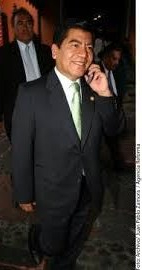
The Governor of Puebla, Mario Marin, – who had arranged for Lydia Cacho to be kidnapped and tortured, – was now being contacted by diplomats, international human rights organizations and journalists, and urgently pressed to make sure Lydia Cacho got to Pueblo alive. Lydia Cacho: “(No one) could have ever imagined that the criminal collusion surrounding the events that were still unfolding had in fact been orchestrated by the Governor himself, and that three other Governors were involved in the plot to have me killed.”
*
The car suddenly stopped. ‘How about a little swim?’ Montano asked happily, while Perez lit a cigarette. “It was dark out,” Lydia Cacho said. “The two agents rolled down their windows and asked me a couple of times if that noise they were hearing was the sound of the ocean. ‘I think so,’ I replied. The Liberty pulled up even with us and the men spoke to each other through the open windows. The man (driving the Liberty) shouted over: ‘Here it is, the ocean, it looks pretty calm. We’re gonna go get some shrimp cocktails.’ The street was deserted, and all the seafood joints lining it were closed. I found myself trying to reason with them almost like a small child: ‘But everything’s closed, seafood restaurants don’t stay open in the middle of the night! Why are you all leaving? Where are you going?’ Nobody responded. Slowly it dawned on me and I thought silently, They’re leaving so the others can throw me into the ocean. I called in anguished silence to my dead mother. Please, Mama, please don’t let them throw me into the sea, no one will ever find my body…”
‘No,’ Montano said, changing his mind. ‘We’d better just get going.’ Lydia Cacho collapsed in relief. But then she saw the Liberty was driving off anyway, and that Montano and Perez weren’t moving. “(T)hey turned off the engine, and Montano got out. From the driver’s seat, Perez asked halfheartedly, ‘Don’t you feel like swimming?’ and he motioned toward the door with his gun. He stepped out of the car, leaving his door open… ‘Whenever you’re ready,’ Perez said to me… ‘Bet you don’t feel like writing anything now, do you? Not feeling so brave, anymore, are you, to walk around telling lies and defaming people like that?’… My body felt heavy and I kept imagining the weight of a rock tied to my legs… Perez suddenly spoke more loudly, pretending he didn’t know I was listening. ‘Like the boss said, she was acting very belligerently, she tried to escape, and she ran into the water. We tried to find her, but it was just so dark out’… Perez opened the other door and I felt glued to the seat. He pulled my hair so strongly that I moved with him. He pulled me out onto the sidewalk where I fell on my knees, crying…”
“(T)hey debated shooting or drowning me,” Lydia Cacho told the reporter McGeough, offering more details than provided in her book-length account.“For maybe an hour they’d put me in the car, pull me out, push me towards the water, then drag me back.”
Perez dragged Lydia Cacho to the ocean by her hair, deciding, finally, to drown her. ‘She got hysterical and we couldn’t pull her back out. We were just trying to do our job,’ Perez said, lifting her up off the ground to hurl her into the ocean, ‘and bring her in safe and sound.’ Montano’s cell phone rang. Lydia Cacho was dropped. Montano answered and kept his replies short: ‘Yes. No. Yes, sir. No, sir. Yes. All right, sir.’ Having received new orders from Governor Marin, Montano signaled Perez to put Lydia Cacho back in the car. Lydia Cacho: “He hung up and spoke to Perez through gritted teeth. ‘Change of plans.’” When she was in the back seat again, Montano spun around to look at her. Sarcastically, he said, ‘You’re famous, ma’am. You’re on TV now.’”
*
Lydia Cacho: “We…began our ascent into the Veracruz mountains. Cold came streaming in through the front windows, which were now completely rolled down. The two agents smoked in the front seat while I struggled to remain awake, my face now leaning against the glass… Montano spoke suddenly, his voice shaking me out of my trance. ‘We’ll be arriving in a few hours, so don’t you forget, like we said – you tell them we treated you well, and we won’t do a thing. But if you start blabbing, well then, you know how it is ma’am – we know where you live and we know where you work, we even know what beaches you go to… We know where your father lives. We know everything about you.’” They even knew, they told her, that one security grille on her apartment was loose and ‘easy to open.’
In a town called Hope, they pulled up next to a red car. Lydia Cacho: “Out of this vehicle stepped a tall, dark man with a mustache. He was visibly exasperated… He directed two female plainclothes (Puebla) Police agents sitting in his vehicle to get out of his car. He ordered Perez to get out and practically shouted his instructions to the two women. ‘You two have been in the car with her since Cancun.’” Montano took over the wheel and the two women got into the car. One offered Lydia Cacho her lipstick. ‘Fuck off,’ Lydia Cacho said.
*
As they arrived at the building of the Puebla Attorney General, the media awaited them. At the top of the building’s steps a bank of TV cameras and reporters, along with Lydia Cacho’s family, watched as they approached. The men in the Liberty, still following them, called and told Montano: ‘Go to the main entrance. – And make sure they see her with the women.’ Lydia Cacho: “The two female agents got out of the car and escorted me, one on each arm, as though they had been at my side the entire time.” As they ascended the steps, under her breath, Lydia Cacho said: ‘The toll booths in Merida have cameras; they’re going to know you weren’t with me.’
As the two female agents pushed Lydia Cacho through the press, Lydia Cacho’s sister stepped forward and held her. “Everything’s going to be OK,” her sister whispered. Lydia Cacho heard not her sister’s voice, but the voice of her mother, before the two female agents pulled Lydia Cacho back. Finally, Lydia Cacho thought, the nightmare is over.
Inside the building, the two female agents took Lydia Cacho into a room, with Montano following, and closing the door behind them. “A new and very aggressive group of agents burst into the room,” Lydia Cacho recounted, “and told Montano to hold it right there. They argued briefly, and Montano told them that he had orders to get me to my prison cell as quickly as possible, but the others ignored him, and one yanked me by the arm and shouted, ‘Get downstairs!’” Lydia Cacho was hustled downstairs by this new group of agents, who were strangely at odds with each other. “I saw that there were two distinct groups of agents,” Lydia Cacho said. “Some had been instructed to feign restraint, and others were highly irate and barking counter-orders.” The female agents followed, showing signs of fear. Downstairs, Lydia Cacho said, “(A) young man came over to me, and I tried smiling at him, hoping to elicit some feeling of compassion… He avoided my eyes and shoved me carelessly against the wall as if I were a sack of potatoes. With everyone watching, he pulled the front of my jacket open and, pretending to slip, placed his hands on my breast and grinned. Then he hung a numbered sign around my neck, stood back, snapped a few photographs, told me in a tired automatic voice to turn first to one side, then the other, and the next thing I knew he grabbed me by the hair without a word and slammed my head against the wall.”
Lydia Cacho was put in a Gessel chamber – a confession room with a two-way mirror. “(O)n the ground in front of me lay a torn mattress reeking of urine and blood. It was covered in multiple dried bloodstains… A few minutes passed, then the door opened and the strongest-looking of the men walked in, tossed out a couple of insults, and told me it was time I was taught a lesson, ‘to see if you really want to go on writing lies.’ I couldn’t believe it; I no longer had the strength to believe any of this. My family was right there, upstairs, just a few steps away – and they were going to beat me up?”… For awhile I could not remember how many times the man shoved and pushed me around the cell. It was only years after I was able to read the deposition of three witnesses in my torture case that one woman had said, ‘We thought he was going to crush her head against the wall so many times.’ I lost all sense of time…”
*
“The door opened suddenly,” Lydia Cacho said. “A man wearing a jacket with the embroidered initials of the (Puebla) State Human Rights Commission on it was shown into the room. [This, Lydia Cacho will later learn, is the President of the Puebla State Human Rights Commission]. He walked over and stood facing me, holding a piece of paper in one hand and a pen in the other… He greeted me as though we were acquaintances getting together for a quick meal in a cafeteria rather than strangers meeting for the first time in a torture cell. He didn’t ask but told me that I had been treated very well by the police and that I should sign the Human Rights Commission’s document he was holding out to me… I refused to sign… The man told me I looked just fine to him, that it didn’t appear as though I’d been mistreated at all.” Lydia Cacho marveled: Who could possibly have the power to set all this in motion…?
A woman Senator Lydia Cacho knew came in and embraced her. ‘They want to kill you,’ the Senator whispered. ‘It’s the Governor of Puebla.’ Later, for having had the compassion to embrace Lydia Cacho, as Lydia Cacho, for the first time since this nightmare began, broke down and cried, – this Senator with a 30-year political career who belonged to the same political party as Governor Marin and Mexico’s President, would be deleted from all future ballots – punishment for having held Lydia Cacho as she wept.
Puebla’s Police Chief, who’d been behind the two-way mirror watching the man slam Lydia Cacho’s head against the wall, announced that Lydia Cacho would now be going to jail. It’s ironic, Lydia Cacho thought. I actually feel safe going to jail! Taken outside, she was then driven from the building of the Puebla Attorney General to Puebla’s Jail. “There were several cars following behind us carrying my family, human rights advocates [real ones], and members of the media.”
*
At Puebla’s Jail, three men in black military uniforms carrying long guns escorted Lydia Cacho to a strip search by a woman prison guard. The men positioned themselves so they could watch from a distance. ‘Are you the one on the television?’ the woman guard whispered. ‘The one who wrote the book about Kamel Nacif and the raped children?’ ‘Yes,’ Lydia Cacho answered. ‘Nacif has some of his people in here,’ the guard cautioned in a conspiratorial whisper. Then she hissed urgently under her breath, ‘Don’t let them take you into the high-security area… They’ve got it all set up – you’re going to be beaten and raped’… ‘But how? Who?!’… ‘Some of the female prisoners,’ the guard replied. ‘With broomsticks’… ‘Please, please,’ Lydia Cacho begged. ‘Don’t let them hurt me!’ The female guard told the three men that due to the prisoner’s high fever, she must take the prisoner to the infirmary, and that their orders to take the prisoner elsewhere will have to wait.
At the prison infirmary, a young woman with a dragon tattoo an an IV in her arm kept up a lively and mostly one-sided conversation with Lydia Cacho. ‘Did Kamel Nacif put you in here? You’re not going to get out. He’s in charge here; a lot of girls are in here because they complained about abuses at his sweatshop factories.’ Lydia Cacho said the charges against her weren’t criminal, that she should be out in a few hours. ‘Neither are mine,’ the young woman said. ‘They don’t even have any evidence against me, and I’ve been here six months’… Other women in the infirmary, Lydia Cacho recounted, “talked about the power Kamel Nacif wielded in Puebla, and about his associate, [also a sweatshop owner, both of] who exploited prisoners by putting them to work in their textile factories.” Kamel Nacif, Lydia Cacho will later learn, also opened his factory operations within the prison itself, forcing the female prisoners into slave-labor. Lydia Cacho also will later learn that Kamel Nacif trafficked people (from China, for example) for forced labor in his Mexican sweatshops, these slave-labor trafficking arrangements helpfully pushed through by the President of Mexico himself, – a personal friend.
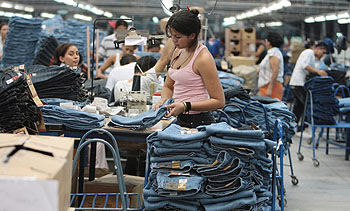
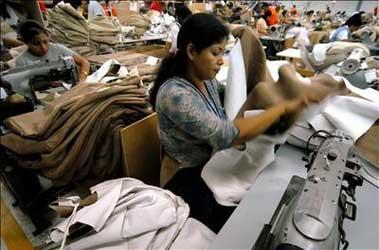

*
A female guard came to the infirmary to inform Lydia Cacho she was now to be taken to a special holding cell. Although this is not included in her book-length account of events, Lydia Cacho told the journalist McGeough that in the special holding cell, she was held down by female prisoners as other female prisoners raped her, that afterwards, they beat and tortured her, that the rape was paid out and arranged by the Puebla State Attorney General, – a woman, – Blanca Laura Villeda Martinez, – under the orders of Kamel Nacif.
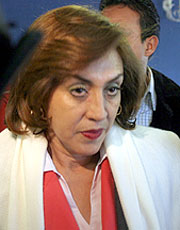
The journalist McGeough: “Why has Cacho chosen to reveal the Puebla rape now? She isn’t sure – and she seems somewhat surprised that the words tumble so easily from her mouth… ‘In Infamy, I wrote about the rape – and then I removed the passage. I wasn’t ready to talk about it. There were so many interviews that focused on my ability to understand and to explain, and I can’t tell you how many TV interviewers tried to make me cry. – So I thought it was healthy to not talk about it. I’m not interested in sitting down to talk about how it affects the rest of my life…’”
After the assault by the female prisoners, Lydia Cacho explained, “I was fainting when they told me to put my clothes back on… I grabbed hold of the bars and felt my legs giving way – I could no longer stand upright. I crumpled into a crouching position close to the floor and called to the guard, who graciously brought me a plastic chair.”
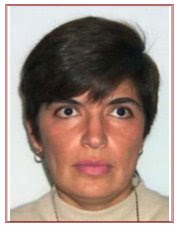
Lydia Cacho was hunched in the plastic chair in her jail cell, when a woman judge, – Judge Rosa Celia Perez Gonzalez, – appeared before her. “It was I,” Judge Rosa Celia Perez Gonzalez announced, “who ordered your detention.” For the first time since this nightmare began, Lydia Cacho was now finally read the charges against her. For writing about Kamel Nacif’s links to the international child rape and child porn network in The Demons of Eden, Lydia Cacho was being charged with defaming Kamel Nacif. Lydia Cacho: “The Judge read me the entire report and at long last I realized that the whole thing was actually an attempt to defend the pedophile Succar Kuri.” The Judge showed Lydia Cacho a retraction Emma had signed. The Judge then handed Lydia Cacho a prepared retraction and told her to sign it. Lydia Cacho: “After 20 hours of abuse in the car and (then the) rape and torture in prison, they (wanted) me to sign a prepared statement, which would have been an admission that The Demons of Eden was lies; that I had concocted it all to make myself famous.” Lydia Cacho told the Judge she would not sign. “I was agog,” Lydia Cacho said. Interestingly, Lydia Cacho was agog not at the retraction the Judge wanted her to sign, but now that Lydia Cacho understood what was happening, she was agog at how her situation could effect the victims of Succar Kuri: “If I was to remain in prison, the (US Magistrate) who was holding Succar Kuri behind bars in Arizona would think that the contents of my investigation were false, and that would contribute to Succar Kuri being set free! Then the girls…would be brought back into the pedophile’s fold. No, we could not allow this…”
The Judge, intent on keeping Lydia Cacho in jail, set an unreasonably high bond, orders of magnitude higher than any bond ever set in the State of Puebla – and did so at 3 pm on a Saturday afternoon, knowing banks in Mexico had just closed for the weekend.
After the Judge’s appearance, Lydia Cacho’s family was allowed to see her in her cell. Family members, trying to lift her spirits, rushed in snapping pictures of her behind bars: “Smile!” they said. And, – seeing them, – she did.

Against all odds, Lydia Cacho’s family, friends and supporters emptied their pockets, coming very close to meeting the outrageous bail set by the Judge. The Judge, not anticipating this, called up the chain of Pedo Elites for instructions. “Later,” Lydia Cacho said, “we would discover that the…Judge had called the cell phone of the Chief Justice of the Puebla Superior Court of Justice,…who in turn telephoned Governor Marin,…who called Kamel Nacif.” And Kamel Nacif, of course, was acting in the interest of the King of them all, – the man who supplied five-year-old girls for rich men to rape.
*
Having met bond, Lydia Cacho was released. Lydia Cacho: “I was escorted from the building by several armed men. In an instant, I was outside. Free. I looked around me…but I couldn’t see my family. Then I spotted them in the distance…We ran towards each other…” Lydia Cacho’s release, however, was conditional: she had to report to Puebla’s Jail in person once a week for a year, over 1,000 kilometers from home; she had to submit to psychological and medical examinations, day or night, whenever summoned; and she could be re-arrested at any time. If Lydia Cacho loses this case, if she is found guilty of having defamed Kamel Nacif, – she will be sent to prison. Puebla Attorney General Blanca Laura Villeda Martinez, who arranged for female prisoners to rape Lydia Cacho in jail, told reporters that should Lydia Cacho be found not guilty, she would then ‘see to it personally’ that Lydia Cacho be ‘locked away.’
Meanwhile, the Puebla defense team which had been assigned Lydia Cacho’s case – before even meeting her – quit. – Given the death threats and all. Now Lydia Cacho had to find a lawyer: “The first such expert to agree to work with me never showed up at the Court on the day of the hearing, claiming to have been afflicted with a bout of diarrhea that rendered him unable to leave the house. The person who had recommended his services later admitted to me that the lawyer had in fact spent all night going over my book and the evidence for the case and simply didn’t have the courage to tell us that he was scared…” The Anti-Drug Czar gave Lydia Cacho an armored vehicle and assigned six new special agents to guard her.
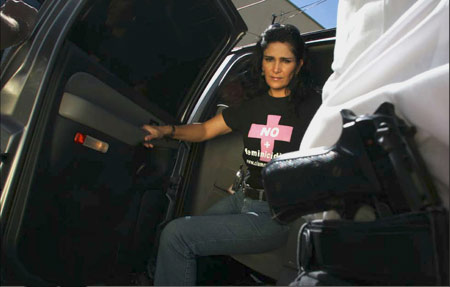
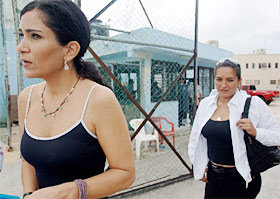
*
Lydia Cacho: “The idea that practically the whole of the Puebla justice system as well as the State’s Governor were conspiring against me seemed absurd, and I for one refused for a time to believe it was true. But the reality of the matter turned out to be unfathomably shocking.”
*
It will be learned that – yes, – the whole of the Puebla justice system as well as the Governor of Puebla were conspiring against Lydia Cacho, – as well as 30 Mexican leaders, – including five Governors, two Senators and the Federal Police Bureau Undersecretary. Even possibly the President of Mexico himself. The President of Mexico will publicly call Lydia Cacho: “The enemy of the people.” (For those unfamiliar with this grisly historical reference, Josef Stalin, the lunatic totalitarian who killed more people than Hitler, publicly denounced a person as “The enemy of the people” before they ended up dead).
*
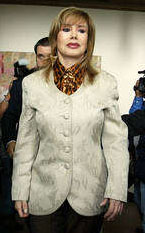
An unbelievable thing then happened. Kamel Nacif beat his wife so viciously, she almost died. Though she fled their home, she feared her husband would hire a hitman to kill her. Trying to stay alive, trying to be one step ahead of any hired hitman, Kamel Nacif’s wife was taping her husband’s phone calls. On Valentine’s Day, February 14, 2006, Kamel Nacif’s wife anonymously surrendered these tapes to the media. In one Kamel Nacif conversation, while Lydia Cacho is being abducted and tortured by the goons in the car, Kamel Nacif thanks Puebla Governor Marin for “smacking” Lydia Cacho. Kamel Nacif tells the Governor he is sending him two bottles of cognac in thanks. These men call each other “Daddy,” “Precious,” and “Hero;” they are jubilant. In another phone conversation, Kamel Nacif is talking with his sweatshop-owning associate who is at the Puebla Attorney General building as Lydia Cacho is brought in by the two women agents. The associate suggests to Kamel Nacif that women prisoners should rape Lydia Cacho. Kamel Nacif tells the associate that that has already been arranged. In another call between the same men, they discuss the Judge, the associate telling Kamel Nacif: ‘She is a true brother to us, a thousand times over.’ Kamel Nacif arranges a thank you pay-off for the Judge – an all-expense-paid trip to Las Vegas. In another recording, an older recording, Kamel Nacif talks to Succar Kuri himself, from whom he orders two girl-children “to fuck.” One of the girls Kamel Nacif orders from Succar Kuri was the Salvadoran girl who later disappeared and who Succar Kuri later told his lawyer he killed. Kamel Nacif’s wife will later seek safety in Lydia Cacho’s shelter, where shelter staff will help this woman escape from Kamel Nacif and out of Mexico.
The media played these phone messages over and over again. Sales of The Demons of Eden  went through the roof. And then another unbelievable thing happened: 40,000 people took to the streets, bravely calling for Puebla Governor Marin’s impeachment. Other protests followed, in support of Lydia Cacho. A democracy protest of this scale had not taken place in the State of Puebla in over a century.
went through the roof. And then another unbelievable thing happened: 40,000 people took to the streets, bravely calling for Puebla Governor Marin’s impeachment. Other protests followed, in support of Lydia Cacho. A democracy protest of this scale had not taken place in the State of Puebla in over a century.
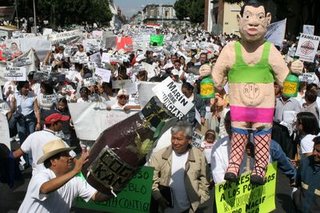


*
Lydia Cacho: “My case had taken a step forward, and the consequences were almost immediate: My telephone started ringing off the hook…the Puebla State Attorney General (Blanca Laura Villeda Martinez) stepped up her attacks against me in the press…the death threats multiplied…and I received communications from third parties operating on the Governor’s behalf wanting to know ‘how much money’ I would need ‘to let the whole thing drop’… People were stopping me on the street to take photos with me, to ask for my autograph, or to tell me what a big impact my book had on them. My three person security detail – (now) two men and one woman – found they had to step up their vigilance; we couldn’t be sure whether one of these people approaching me with a smiling face might not also be carrying a gun.”
*
At a later point, the United Nations Human Rights Council will advise Lydia Cacho to leave Mexico. They will recommend she seek political asylum. Consequently, Lydia Cacho will be offered political asylum by several countries, including the United States under the Obama administration. But Lydia Cacho will refuse: “I think if somebody has to leave my country, it should be the mobsters,” she will say. “Why me? — I love Mexico.”
